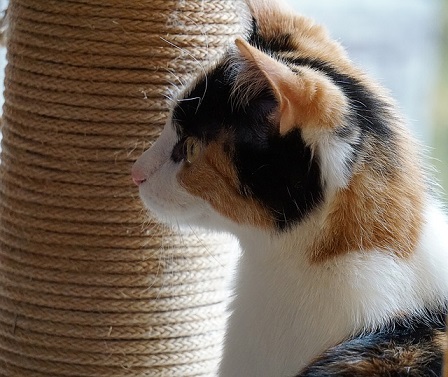
Understanding Why Female Cats Spray
Many cat owners confuse urine spraying with normal urination. However, these are two distinct behaviors. Urine spraying is a natural territory-marking behavior that female cats may exhibit, and it is not related to improper litter box use. While this behavior is normal, it can lead to strong odors in your home, making prevention essential.
Common Reasons Why Female Cats Spray
1. Territorial Marking
Cats spray to establish their territory, especially when they see other cats nearby. Female cats typically spray as a sign of reproductive availability. They may also spray due to stress or anxiety, which can trigger this behavior.
2. Mating Behavior
Spraying can be a way for both male and female cats to communicate with potential mates. Unspayed cats, particularly during their estrus cycle, are more likely to exhibit spraying behavior as a way of marking their territory and signaling their availability to mates. According to VCA Hospitals, spraying is a common behavior in cats that are not spayed or neutered, especially when they are in heat.
3. Stress and Anxiety
Changes in the household or in the cat’s routine, such as the introduction of new pets, or even rearranging furniture, food or the litter box can cause stress, which may lead to spraying. According to guidelines from the American Animal Hospital Association, stress and environmental changes can significantly affect a cat’s behavior, including urinary soiling. Cats in stressful environments are more likely to spray as a way of coping with their anxiety.
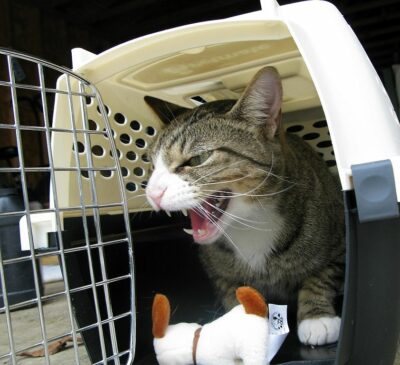
4. Multi-Cat Household Tensions
If your cats do not get along, spraying can be a way of claiming dominance or personal space. According to research by Jensen et al. (2019, study published), ‘The risk of urine spraying in a home appears to increase with the number of cats in the house.’ Cats living in multi-cat households with high levels of conflict are more likely to exhibit marking behavior, as they may spray to assert dominance and reduce perceived competition.
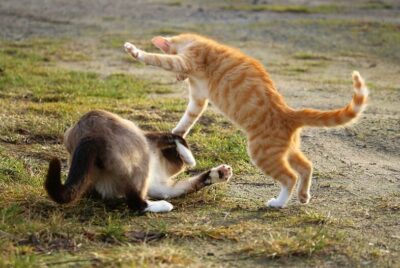
5. Medical Issues
In rare cases, urinary tract infections or other health problems can lead to spraying, so a vet check is recommended if the behavior is sudden. According to the Journal of Feline Medicine and Surgery, urinary tract infections (UTIs) and other health issues could be causes for inappropriate urination. However, spraying due to health issues is relatively rare compared to behavioral causes.
6. Sightings of Neighborhood Cats
If your female cat frequently spots another cat outside through the window, this could trigger territorial marking behavior. Cats are highly territorial, and seeing another cat nearby, especially one they don’t get along with, may lead to stress and spraying as they try to mark their territory. This is particularly common in homes with outdoor-access cats or cats who are frequently exposed to outside stimuli.
7. Catnip as a Potential Trigger
Catnip mimics feline sex hormones, which can cause some cats to behave as if they’re in heat (source: Gilbertsville Veterinary Hospital). While not all cats react this way, I’ve noticed that in my experience, catnip use can coincide with spraying behavior in female cats. If you often give your female cat catnip, this could be a possible cause. For more details, check out my article on what happened with my cat spraying outside the litter box after consuming catnip.
Cat spraying after right after eating catnip
How to Prevent Female Cats from Spraying
1. Spay Your Cat Early
One of the most effective ways to prevent female cat spraying is to spay them before six months of age. This can reduce hormonal triggers that contribute to spraying behavior by up to 95% (source: PetMD, Christina Hawkins, DVM). However, even if spayed early, some female cats may still display spraying behavior. A study published by the NIH, which followed 152 female cats spayed between 6 and 10 months of age, found that 5% of them continued to spray frequently into adulthood. While a small percentage of spayed cats may still exhibit spraying behavior, spaying early remains one of the most reliable and effective solutions to prevent this issue in the majority of cases.
3. Minimize Outdoor Triggers
If your cat sees other animals outside, she may feel the need to mark her territory. Reducing outdoor stimuli is crucial. Moving furniture away from windows, covering the lower portion of windows, or closing drapes and blinds can help prevent your cat from seeing potential intruders. You may also want to provide an indoor play area to redirect her attention, giving her a more positive outlet for energy.
4. Foster Positive Relationships in Multi-Cat Homes
Homes with multiple cats are more prone to spraying issues due to competition. Therefore, encouraging harmony among your cats is essential. The American Animal Hospital Association guidelines suggest that providing an enriching environment and social bonding opportunities can help cats in multi-cat households engage in more positive behaviors, reducing anxiety and aggression. Activities like playing together, offering equal attention, and promoting mutual grooming can help alleviate spraying behavior by fostering a calmer, more balanced dynamic. (Source: AAHA)
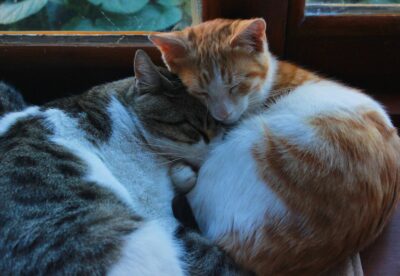
4. Reduce Stress and Maintain a Routine
Cats are creatures of habit, and inconsistency can lead to anxiety. Establishing a consistent daily routine to reduce stress helps keep them relaxed. Feed your cat at the same time each day, keep their litter box and bed in the same place, and avoid sudden changes in the household. Research shows that cats who have more predictable environments tend to exhibit fewer stress-related behaviors, including spraying.
1. Eliminate Catnip to Prevent Spraying
If your female cat sprays, try removing catnip from her environment to see if her behavior changes. This includes catnip-infused toys. If she frequently consumes catnip, testing this first could save you from trying other solutions that may not address the real cause.
5. Prevent Spraying with an Automatic Litter Box
A clean litter box is essential in preventing unwanted spraying. Automatic cat litter boxes can help maintain a fresh-smelling environment by scooping waste regularly and reducing odors that may trigger marking behavior. Cats are more likely to mark territory if they feel their litter box is unclean. Automatic litter boxes can also accommodate different cat sizes, ensuring comfort for all your pets.
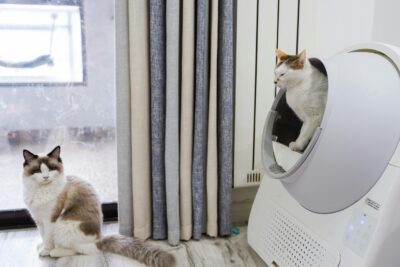
Choosing the Best Automatic Litter Box
If you’re considering an automatic cat litter box as part of your spraying solution, make sure to choose one that fits your cat’s needs. Look for options that handle the volume of waste your cat produces and are easy to clean. On our website, we offer detailed reviews of the best automatic cat litter boxes available, helping you make an informed decision.
By understanding why female cats spray and taking the right steps to prevent it, you can keep your home odor-free and your cat stress-free. Research and expert recommendations show that early spaying, managing stress, fostering positive relationships, and ensuring a clean environment can significantly reduce spraying behavior. With these strategies in place, you’ll be able to address this common issue and provide a better quality of life for both you and your feline companion.
Leave a Reply